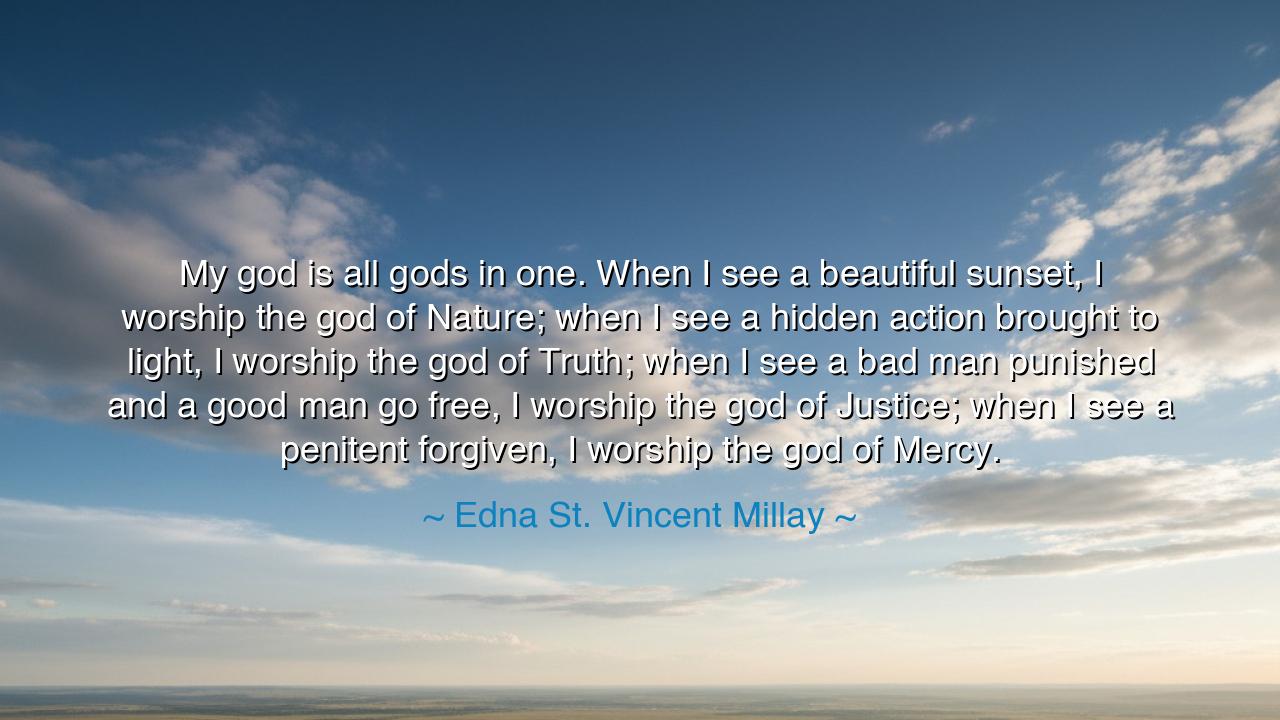
My god is all gods in one. When I see a beautiful sunset, I
My god is all gods in one. When I see a beautiful sunset, I worship the god of Nature; when I see a hidden action brought to light, I worship the god of Truth; when I see a bad man punished and a good man go free, I worship the god of Justice; when I see a penitent forgiven, I worship the god of Mercy.






In the radiant words of Edna St. Vincent Millay, poet of fire and soul, we hear a vision of divinity vast and unconfined: “My god is all gods in one. When I see a beautiful sunset, I worship the god of Nature; when I see a hidden action brought to light, I worship the god of Truth; when I see a bad man punished and a good man go free, I worship the god of Justice; when I see a penitent forgiven, I worship the god of Mercy.” This is not the doctrine of one creed, but the hymn of a spirit who sees the divine in all places, manifesting through the many faces of creation and human life.
To call god all gods in one is to break the chains of narrow worship and embrace the boundless. Millay speaks of a unity where divinity is not trapped in a temple, nor bound by one name, but revealed in the unfolding of the world itself. The sunset, with its blaze of colors, becomes not just beauty but worship, for in it she sees the majesty of Nature, eternal and ever-changing. She reminds us that worship need not always be ritual; sometimes it is the lifting of the eyes to the horizon, the silence of awe before the sky.
The god of Truth is revealed when darkness is dispelled, when secrets come to light, when deceit is stripped of its mask. In such moments, Millay sees the sacred—not in incense or hymn, but in the triumph of honesty over concealment. This is the divine as revealer, the eternal companion of justice and wisdom. For what is truth but the foundation upon which all righteousness stands? Without it, both law and mercy collapse. Thus, to her, every unveiling of truth is a holy act.
The god of Justice appears when balance is restored—when the wicked face consequence and the righteous walk free. This is a vision as old as mankind’s longing for fairness, yet as necessary now as in the days of Hammurabi or Solon. History shows us the hunger for this god: when Nelson Mandela walked free after long imprisonment, the world rejoiced, for in that moment the god of Justice had risen. Millay places such moments in the realm of the sacred, for to see justice done is to glimpse eternity setting the scales aright.
Yet she does not stop at justice; she ascends to the higher god of Mercy. For justice alone, though noble, can be cold and sharp. But when the penitent is forgiven, when the guilty is redeemed through love, another face of divinity is revealed. Mercy tempers judgment with compassion. This is the god who shines in the parable of the prodigal son, who softens the hearts of rulers, who transforms punishment into renewal. Millay honors this as the highest kind of worship: to see not only wrongs avenged, but hearts restored.
The meaning of Millay’s vision is that divinity is not far away but woven into the fabric of existence. God is not a distant monarch but the living pulse within Nature, Truth, Justice, and Mercy. Each experience of wonder, revelation, fairness, or forgiveness is itself an act of communion. Her words remind us that to live attentively is to live religiously, for each day offers encounters with the sacred if only the eyes of the heart remain open.
The lesson for us is clear: seek the divine not only in sacred texts or holy places, but in the unfolding of life itself. When you gaze at beauty, let it teach you reverence. When truth is revealed, let it call you to honesty. When justice is done, let it stir you to righteousness. And when mercy is given, let it move you to compassion. These are not abstractions, but practices to embody: protecting the earth, speaking the truth, defending the innocent, forgiving the guilty. In such acts, we too worship the god of all gods.
Thus Millay’s words shine like a psalm for all ages: “My god is all gods in one.” Let us carry this wisdom, that every sunset, every act of justice, every truth unveiled, every mercy shown, is not mere circumstance but revelation. And let us live as worshippers not only in temples, but in the very world itself—where nature speaks, truth triumphs, justice reigns, and mercy heals. For in these, the divine is forever present.






AAdministratorAdministrator
Welcome, honored guests. Please leave a comment, we will respond soon